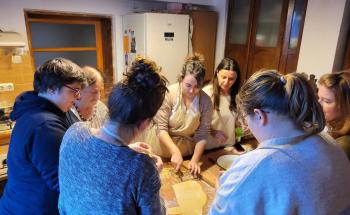Organizational culture and team formation in school units
Organizational culture plays a crucial role within a school and can have a significant impact on students, teachers and support staff. The objective of the course is to understand the team building process and the stages of group development as well as to show and practice effective communication skills.
We are always ready to help you with information about accommodation, transport and anything
Description
Organizational culture plays a crucial role within a school and can have a significant impact on students, teachers and support staff. Here are some relevant aspects about the importance of organizational culture in a school unit: Positive School Climate: Organizational culture contributes to the creation of a positive school climate. A pleasant and supportive atmosphere can positively influence the academic results of students and the well-being of the entire school community. Motivation and Commitment: A well-defined and promoted organizational culture can help increase the level of commitment of teachers, staff and students. When members of the school community feel motivated and connected to the school’s values and goals, they are more likely to work toward educational goals. Effective Collaboration and Communication: A healthy organizational culture encourages effective collaboration and communication among all those involved in the educational process. This can facilitate the sharing of ideas, best practices and resources between teachers, school staff and parents. Shared Educational Values: Organizational culture defines the values and norms that guide behavior and decisions within the school. Shared values such as respect, integrity and responsibility contribute to the formation of students’ character and the development of an ethical educational environment. Adaptability and Innovation: An organizational culture open to change and innovation is essential in an ever-evolving educational environment. The ability to adapt to new teaching methods, technologies and educational trends can contribute to improving the quality of education provided. Retaining and Attracting Talent: A positive organizational culture can help retain and attract quality faculty and staff. A healthy and supportive work environment can be an important factor for education professionals.
Learning objectives
Understanding Organizational Culture Concepts:
- Define and explain the concept of organizational culture.
- Identify the elements contributing to the formation and shaping of organizational culture.
Analyzing Cultural Diversity in Organizations:
- Explore cultural diversity in organizations and its impact on the work environment.
- Understand how cultural values may vary across different organizations.
Impact of Organizational Culture on Performance:
- Evaluate how organizational culture can influence employee behavior and performance.
- Identify the connections between culture and organizational objectives.
Promoting Ethics and Organizational Values:
- Examine the role of ethics within organizational culture.
- Encourage respect for organizational values and alignment with them.
Developing Leadership Skills in the Context of Organizational Culture:
- Identify leadership traits that support a healthy organizational culture.
- Develop communication and influencing skills within the organizational culture.
Managing Cultural Change:
- Understand challenges associated with cultural change in organizations.
- Develop effective strategies for managing cultural changes.
Promoting Collaboration and Effective Communication:
- Encourage open collaboration and communication within the organization.
- Identify ways to improve relationships and interactions among organizational members.
Assessing Current Organizational Culture:
- Use assessment tools to analyze and understand the current organizational culture.
- Identify strengths and areas for improvement.
Building Resilience in Organizations:
- Promote the organization's ability to adapt to changes and challenges.
- Understand the concept of organizational resilience and apply it in practice.
Creating an Organizational Culture Action Plan:
- Develop an action plan to enhance or reinforce organizational culture.
Methodology & assessment
Lectures and Presentations:
Deliver foundational knowledge through traditional lectures and presentations.
Use multimedia elements to enhance understanding and engagement.
Case Studies:
Analyze real-world case studies to illustrate the application of cultural concepts.
Encourage critical thinking and problem-solving.
Group Discussions:
Facilitate group discussions to exchange ideas and perspectives on cultural issues.
Promote collaboration and teamwork.
Guest Speakers:
Invite industry experts or leaders to share their experiences related to organizational culture.
Provide insights into practical challenges and successes.
Role-Playing Exercises:
Engage participants in role-playing scenarios to simulate cultural challenges.
Encourage participants to apply learned concepts in a controlled environment.
Field Visits:
Organize visits to organizations with strong or unique cultures.
Provide firsthand exposure to different organizational environments.
Interactive Workshops:
Conduct workshops focusing on skill development within the cultural context.
Include activities to enhance communication, leadership, and teamwork.
Online Resources:
Utilize online platforms for supplementary materials, discussions, and assessments.
Foster a blended learning approach for flexibility.
Assessment:
Individual Assignments:
Evaluate understanding through research papers or essays on cultural topics.
Group Projects:
Assess collaboration skills through group projects addressing cultural challenges.
Class Participation:
Evaluate engagement and contribution to class discussions and activities.
Case Study Analysis:
Analyze and present solutions for cultural issues identified in case studies.
Certification details
Course participants will receive a certificate of attendence as well as an Erasmus + mobility certificate.
Pricing, packages and other information
-
Price:580Euro
Additional information
-
Language:English
-
Target audience ISCED:Lower secondary education (ISCED 2)Upper secondary education (ISCED 3)Other
-
Target audience type:TeacherHead Teacher / PrincipalCompany staff
-
Learning time:25 hours or more
Upcoming sessions
Past sessions
More courses by this organiser

Postural defects at students - their identification and correction




